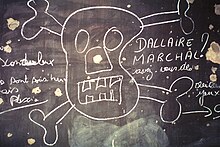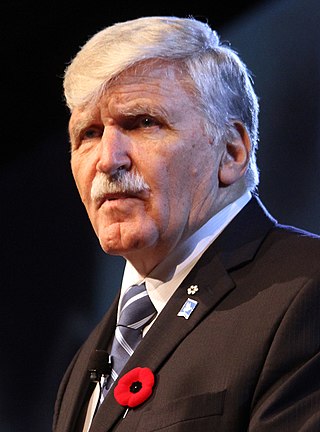
Roméo Antonius Dallaire is a Canadian retired politician and military officer who was a senator from Quebec from 2005 to 2014, and a lieutenant-general in the Canadian Armed Forces. He notably was the force commander of UNAMIR, the ill-fated United Nations peacekeeping force for Rwanda between 1993 and 1994, and for trying to stop the genocide that was being waged by Hutu extremists against Tutsis. Dallaire is a Senior Fellow at the Montreal Institute for Genocide and Human Rights Studies (MIGS) and co-director of the MIGS Will to Intervene Project.

The United Nations Assistance Mission for Rwanda (UNAMIR) was established by United Nations Security Council Resolution 872 on 5 October 1993. It was intended to assist in the implementation of the Arusha Accords, signed on 4 August 1993, which was meant to end the Rwandan Civil War. The mission lasted from October 1993 to March 1996. Its activities were meant to aid the peace process between the Hutu-dominated Rwandese government and the Tutsi-dominated rebel Rwandan Patriotic Front (RPF). The UNAMIR has received much attention for its role in failing, due to the limitations of its rules of engagement, to prevent the Rwandan genocide and outbreak of fighting. Its mandate extended past the RPF overthrow of the government and into the Great Lakes refugee crisis. The mission is thus regarded as a major failure.

The Rwandan genocide occurred between 7 April and 15 July 1994 during the Rwandan Civil War. During this period of around 100 days, members of the Tutsi minority ethnic group, as well as some moderate Hutu and Twa, were killed by armed Hutu militias. Although the Constitution of Rwanda states that more than 1 million people perished in the genocide, the real number killed is likely lower. The most widely accepted scholarly estimates are around 500,000 to 800,000 Tutsi deaths.
The Arusha Accords, officially the Peace Agreement between the Government of the Republic of Rwandaand the Rwandan Patriotic Front, also known as the Arusha Peace Agreement or Arusha negotiations, were a set of five accords signed in Arusha, Tanzania on 4 August 1993, by the government of Rwanda and the rebel Rwandan Patriotic Front (RPF), under mediation, to end a three-year Rwandan Civil War. Primarily organized by the Organisation of African Unity and the heads of state in the African Great Lakes region, the talks began on 12 July 1992, and ended on 4 August 1993, when the accords were finally signed.
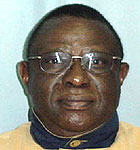
Théoneste Bagosora was a Rwandan military officer. He was chiefly known for his key role in the 1994 Rwandan genocide for which he was sentenced to life imprisonment by the International Criminal Tribunal for Rwanda (ICTR). In 2011, the sentence was reduced to 35 years' imprisonment on appeal. He was due to be imprisoned until he was 89. According to René Lemarchand, Bagosora was "the chief organizer of the killings". On 25 September 2021, he died in a prison hospital in Mali, where he was being treated for heart issues.

Opération Turquoise was a French-led military operation in Rwanda in 1994 under the mandate of the United Nations. The "multilateral" force consisted of 2,500 troops, 32 from Senegal and the rest French. The equipment included 100 APCs, 10 helicopters, a battery of 120 mm mortars, 4 Jaguar fighter bombers, 8 Mirage fighters, and reconnaissance aircraft. The helicopters laid a trail of food, water and medicine enabling refugees to escape into eastern Zaire. Opération Turquoise is controversial for at least two reasons: accusations that it was an attempt to prop up the genocidal Hutu regime, and that its mandate undermined the UNAMIR. By facilitating 2 million Rwandan refugees to travel to Kivu provinces in Zaire, Turquoise setup the causes of the First Congo War.
Joseph Kavaruganda was a Rwandan jurist who served as president of Rwanda's Constitutional Court. He was killed at the beginning of the Rwandan genocide.

The assassination of presidents Juvénal Habyarimana and Cyprien Ntaryamira in the evening of April 6, 1994 was the proximate trigger for the Rwandan genocide, which resulted in the murder of approximately 800,000 Tutsi and a smaller number of moderate Hutu. The first few days following the assassinations included a number of key events that shaped the subsequent course of the genocide. These included: the seizing of power by an interim government directed by the hard-line Akazu clique; the liquidation of opposition Hutu politicians; the implementation of plans to carry out a genocide throughout the country; and the murder of United Nations peacekeepers, contributing to the impulse of the international community to refrain from intervention.

The failure of the international community to effectively respond to the Rwandan genocide of 1994 has been the subject of significant criticism. During a period of around 100 days, between 7 April and 15 July, an estimated 500,000-1,100,000 Rwandans, mostly Tutsi and moderate Hutu, were murdered by Interahamwe militias.
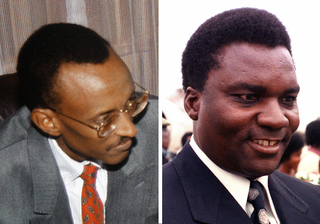
The Rwandan Civil War was a large-scale civil war in Rwanda which was fought between the Rwandan Armed Forces, representing the country's government, and the rebel Rwandan Patriotic Front (RPF) from 1 October 1990 to 18 July 1994. The war arose from the long-running dispute between the Hutu and Tutsi groups within the Rwandan population. A 1959–1962 revolution had replaced the Tutsi monarchy with a Hutu-led republic, forcing more than 336,000 Tutsi to seek refuge in neighbouring countries. A group of these refugees in Uganda founded the RPF which, under the leadership of Fred Rwigyema and Paul Kagame, became a battle-ready army by the late 1980s.
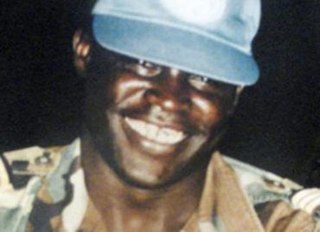
Mbaye Diagne was a Senegalese military officer who served in Rwanda as a United Nations military observer from 1993 to 1994. During the Rwandan genocide he undertook many missions on his own initiative to save the lives of civilians.

The Amahoro Stadium, officially known as Amahoro National Stadium, is a multi-purpose stadium in the Gasabo district of Kigali, Rwanda. With a capacity of 25,000, it is the largest stadium in Rwanda and hosts football matches, concerts, and public events. The football clubs Armée Patriotique Rwandaise F.C. and Rayon Sports F.C. are the tenants. The venue is also sometimes used for rugby union.

Kangura was a Kinyarwanda and French-language magazine in Rwanda that served to stoke ethnic hatred in the run-up to the Rwandan genocide. The magazine was established in 1990, following the invasion of the rebel Rwandan Patriotic Front (RPF), and continued publishing up to the genocide. Edited by Hassan Ngeze, the magazine was a response to the RPF-sponsored Kanguka, adopting a similar informal style. "Kangura" was a Rwandan word meaning "wake others up", as opposed to "Kanguka", which meant "wake up". The journal was based in Gisenyi.

On the evening of 6 April 1994, the aircraft carrying Rwandan president Juvénal Habyarimana and Burundian president Cyprien Ntaryamira, both Hutu, was shot down with surface-to-air missiles as their jet prepared to land in Kigali, Rwanda; both were killed. The assassination set in motion the Rwandan genocide, one of the bloodiest events of the late 20th century.

Stefan Steć was a major of the Polish Armed Forces. In 1994, he served as a peacekeeper in the UNAMIR forces in Rwanda under general Roméo Dallaire. For his dedication in saving lives during Rwandan genocide at the risk to his own, he was awarded the Cross of Merit for Bravery by Polish President Lech Wałęsa. He died at the age of 40 due to complications from posttraumatic stress disorder.
Henry Kwami Anyidoho is a former Ghanaian military officer.

United Nations Security Council resolution 872, adopted unanimously on 5 October 1993, after reaffirming resolutions 812 (1993) and 846 (1993) on the situation in Rwanda and Resolution 868 (1993) on the security of United Nations operations, the council stressed the need for an international force in the country and therefore established the United Nations Assistance Mission for Rwanda (UNAMIR).

United Nations Security Council resolution 912, adopted unanimously on 21 April 1994, after reaffirming all resolutions on the situation in Rwanda, particularly resolutions 872 (1993) and 909 (1994), the council expressed its alarm and condemnation of the large-scale violence in the country which resulted in the death of thousands of innocent civilians, and proposed a revised mandate of the United Nations Assistance Mission for Rwanda (UNAMIR).

United Nations Security Council resolution 918 was adopted without a vote on 17 May 1994. After reaffirming all resolutions on the situation in Rwanda, particularly resolutions 872 (1993), 909 (1994) and 912 (1994), the Council expressed its alarm and condemnation at the continuing large-scale violence, and went on to impose an arms embargo on the country and authorise an expansion of the United Nations Assistance Mission for Rwanda (UNAMIR).

Belgium-Rwanda relations refers to the international and diplomatic relations between Belgium and Rwanda. Belgian relations with Rwanda started under the League of Nations mandate, when the modern day countries of Rwanda and Burundi were governed as Ruanda-Urundi. As the colonial power, Rwanda's relationship with Belgium has been significant throughout the country's history, even after independence.

